Questões de Língua Inglesa da Fundação CESGRANRIO (CESGRANRIO)
Lista completa de Questões de Língua Inglesa da Fundação CESGRANRIO (CESGRANRIO) para resolução totalmente grátis. Selecione os assuntos no filtro de questões e comece a resolver exercícios.
 Based on the meanings in the text, it is clear that
Based on the meanings in the text, it is clear that
- A. sole (line 9) and only express similar ideas.
- B. injured (line 15) and hurt are antonyms.
- C. ensure (line 21) and guarantee express contradictory ideas.
- D. "subtle (line 41) and obvious are synonyms.
- E. odds (line 77) and probabilities do not have equivalent meanings.
 The expression in boldface introduces the idea of consequence in the fragment:
The expression in boldface introduces the idea of consequence in the fragment:
- A. Yet, complying with regulations is not the real reason for working safely. (lines 12-13)
- B. In order to do that, you must first understand what constitutes a hazard. (lines 30-31)
- C. As a result of your safety training and meetings like these, some things may come to mind. (lines 35-37)
- D. However, if there is an unlabeled chemical container and you have no idea what it is, (lines 53-54)
- E. "While nothing we do can completely eliminate the threat of an incident, (lines 75-76)
 According to the text, it is clear that the author
According to the text, it is clear that the author
- A. believes that labor risks cannot be reduced by team efforts and commitment.
- B. expects to be kept informed of potential situations that may be dangerous.
- C. considers the cooperation of workers an irrelevant measure to improve safety at work.
- D. defends that corporate management is accountable for all issues regarding safety at work.
- E. feels that co-workers suggestions are useless in identifying hazards in the work environment.
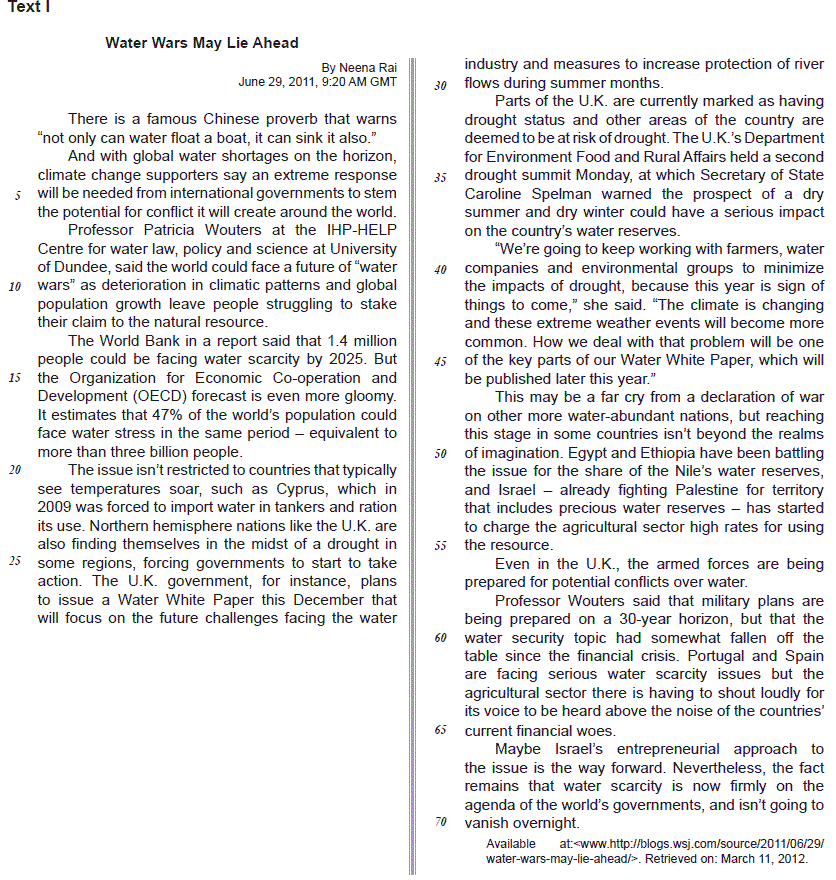
The authors main purpose in Text I is to
- A.
expose some secret military plans to save water for the future.
- B.
alert about the harmful impact of water shortages in the future.
- C.
justify the war between Ethiopia and Egypt for a larger share of the Nile.
- D.
defend the high charges for use of water in agricultural areas in the Middle East.
- E.
complain about the inefficiency of international governments in dealing with water wars.
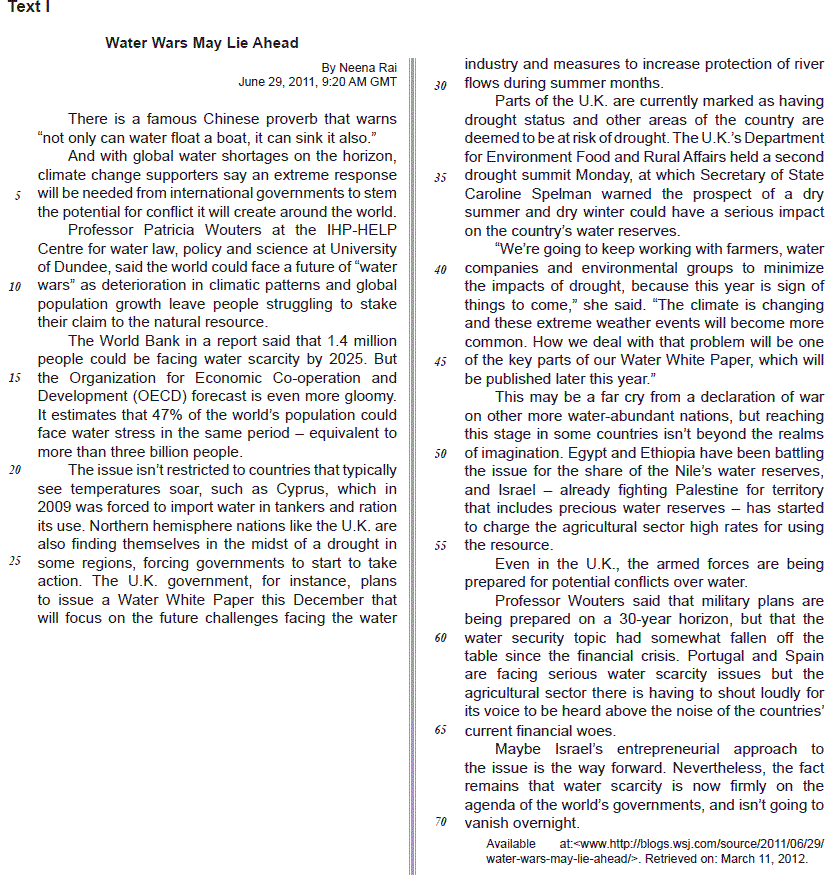
In terms of numerical reference in Text I,
- A.
1.4 million (line 13) refers to the number of people who have been involved in conflicts over water.
- B.
47% (line 17) refers to the percentage of countries in the world already facing water scarcity.
- C.
more than three billion people (line 19) refers to the number of people who might suffer from water shortage by 2025.
- D.
2009 (line 22) refers to the only year when Cyprus faced an unparalleled rise in temperature.
- E.
30-year horizon (line 59) refers to the period of time the financial crisis in Europe will last.
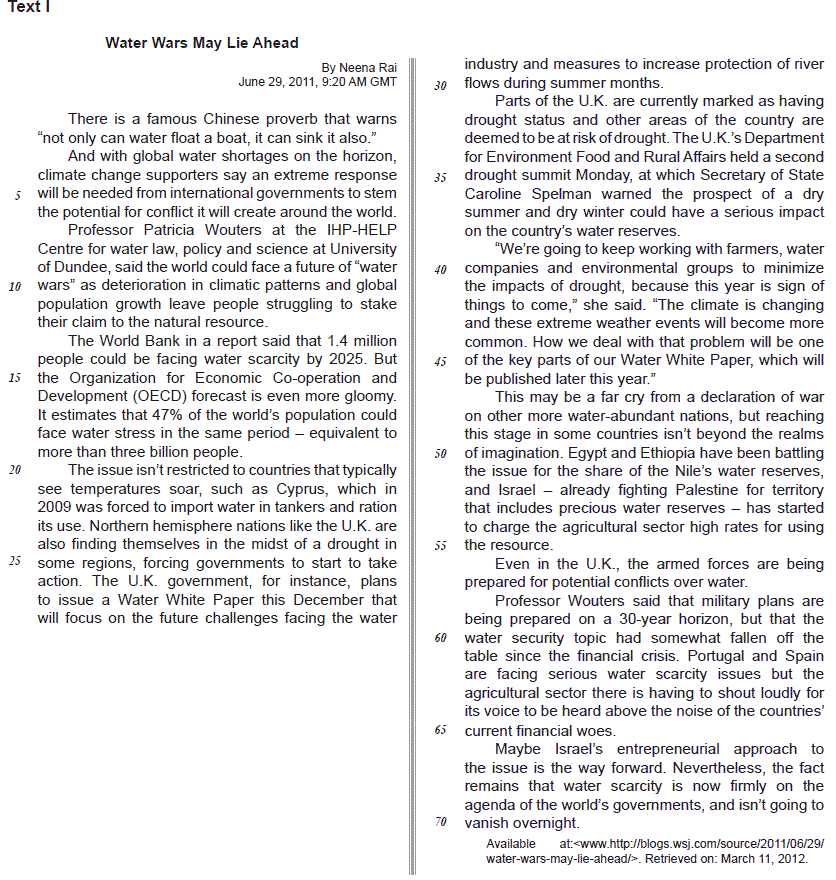
According to Professor Wouters, in Text I, paragraph 10 (lines 58-65),
- A.
Portugal and Spain are more worried about water shortage than about political and financial problems.
- B.
security issues regarding water problems have been somewhat put aside because of the economic crisis.
- C.
the agricultural sector is not really worried about the problems that may come up if the water resources dry up.
- D.
in the UK, the army is fully prepared to fight the countries interested in the British hydroenergy sources.
- E.
he military forces intend to overlook the serious challenges to control the oceans and rivers in the next decade.
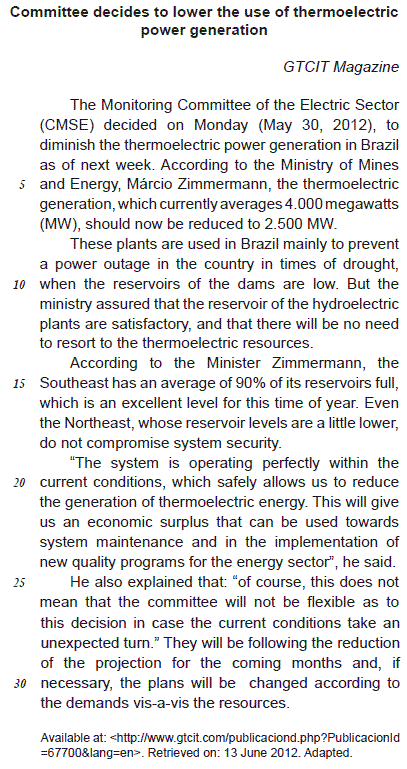
According to the text, CMSE decided on May 30, 2012 to
- A.
upgrade thermoelectric energy to 4.000 MW.
- B.
reduce the amount of energy generated by thermoelectric plants in Brazil at this moment.
- C.
discuss with Minister Zimmermann about the cuts.
- D.
monitor the committee that is regulating the Electric Sector.
- E.
propose the creation of new sources of thermoelectric generation in Brazil at this moment .
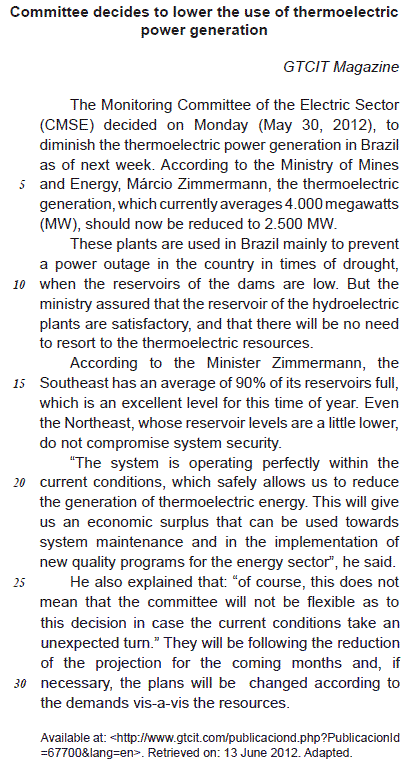
In the text, the word in bold-face type is similar to the word/expression in italics in
- A.
prevent (line 8) induce
- B.
outage (line 9) abundance
- C.
drought (line 9) lack of rain
- D.
dams (line 10) river beds
- E.
resort (line 13) throw
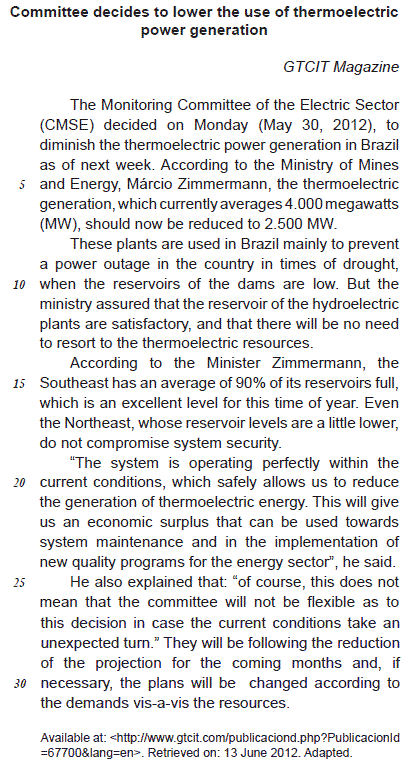
According to the text, the reduction of the thermoelectric power generation is justified because
- A.
Minister Zimmermann believes that the system security is a little fragile.
- B.
Minister Zimmermann is more worried about financial difficulties than about the power distribution.
- C.
the draught in the Northeast is worrying authorities.
- D.
the power system is operating with total security, granted the high levels of the reservoirs.
- E.
nearly 90% of the total financial resources have already been used.
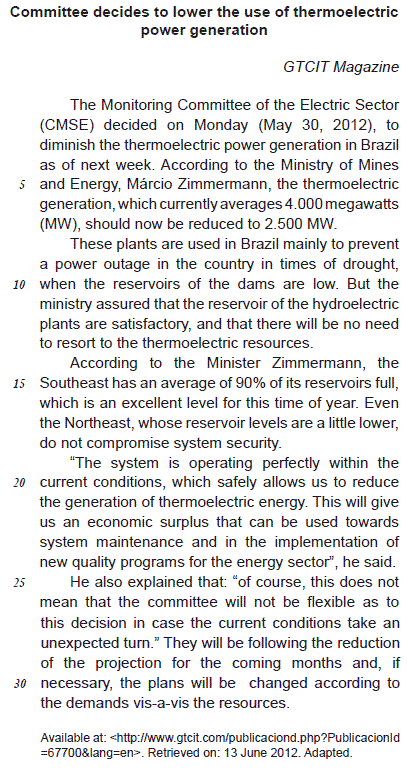
According to the text, a consequence of the thermoelectric energy reduction is the
- A.
maintenance of quality programs.
- B.
enhancement in the quality of the hydroelectric generation.
- C.
perfect operation of the system.
- D.
generation of economic surplus that will enhance the quality of the energy sector.
- E.
possibility of the thermoelectric energy generation work on safer terms because of its smaller production.


